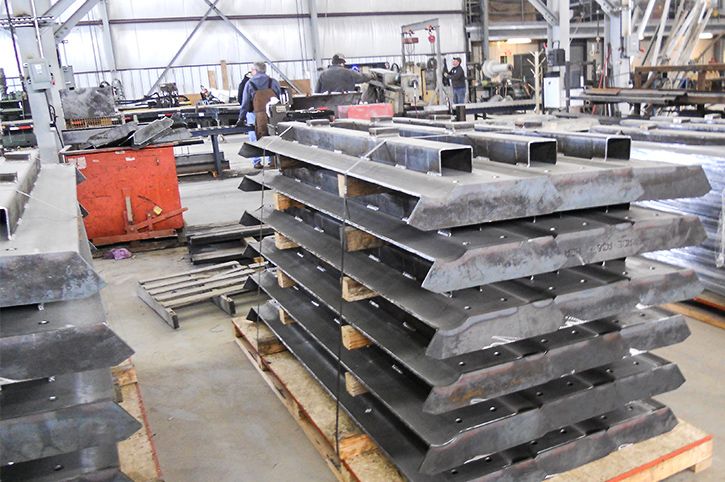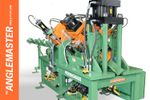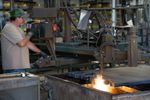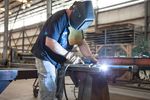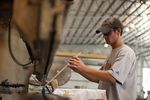When launching a new custom metal fabrication project, finding a fabrication partner who understands your specific needs can be a daunting task. In addition to budget, there are time, quality, and logistical elements to consider. Do you trust them to bring true design-to-delivery capability to your project? Do they practice what they preach?
To ensure you make the right choice for your business, avoid these seven common misconceptions when it comes to selecting a custom metal fabrication partner.
1 — If you already have a design for your metal fabrication project, you don’t need an engineer.
Every successful custom metal fabrication project begins with a successful design-engineering collaboration. Before your design heads into fabrication, you want to make sure the right pieces are in place for translating metal designs into component parts. Then the visualization process can begin.
Take for example, custom steel products, which often go from a “design” to a “fabrication design” prior to the next phase. Following this stage comes product design, then engineering, prototyping, and, finally, fabrication. So behind-the-scenes, there’s a great deal of activity between design and production.
Even if you already have an engineer involved in the design process, there are full-service fabricators with industry leaders on staff who regularly advise engineers in metal fabrication processes.
2 — Fabricators with a professional presentation must know their stuff.
Just because a fabricator promises the moon in a polished PowerPoint®, it doesn’t mean they have the resources to back it up. Ask the fabricator for a tour of their facility. If they refuse, keep looking. If they offer a tour, be wary of a messy shop with obsolete equipment. Metal fabricators who don’t cut corners when it comes to equipment are likely to provide cutting edge technology for your custom project, with a focus on quality and efficiency.
You may want to consider partnering with a full-service fabricator who employs experts that can oversee cutting, forming, assembly, finishing, and installation— all under one roof. They should also possess the physical space, tooling, and equipment to complete your projects on time, every time. There’s also the added benefit of a partner who can maintain tight quality control from design to delivery.
3 — Galvanization is too expensive.
Because of recent advances in hot-dip galvanization, it’s now an increasingly affordable component of custom metal fabrication. The galvanizing process ensures that every area of the steel, even edges and crevices, becomes coated. Once coated, the final product requires little to no maintenance, saving money over time.
Before beginning galvanization, your fabrication partner should address potential costly issues: strain-age embrittlement, working parts with undue friction, or an insufficient zinc coating. Steel can have different thicknesses, which can impact sub-assemblies and components. Additionally, parts with overlapping surfaces could cause the coating to wear more quickly.
4 — The fabricator with the lowest bid will provide better ROI.
A below-budget bid doesn’t mean you’ll see a better return on your investment. When researching custom metal fabrication partners, note that many are not truly full-service, which means there may be hidden costs in outside subcontractors, poor quality control, or lack of communication that could lead to costly mistakes.
Rather than simply gathering bids on a project or parts, manufacturers can source a full-service metal fabricator who is willing to learn more about the nature of your business, your processes, and your customers.
5 — Product inspections aren’t necessary with professional metal fabricators.
When researching custom fabricators, look for a partner with quality control experts on staff. Are they willing to work with third-party inspectors to ensure the final product is up to code? If they offer full-service fabrication under one roof, it’s easier to maintain quality control, including inspections.
Do they put together all assemblies and subassemblies to make sure everything fits as planned? Your fabrication partner’s QC should include documenting everything. Ask if they can send you photographs and paperwork to approve before shipping. Also ask if they are familiar with ASME and American Welding Society protocols, as well as Canadian welding standards.
6 — Custom metal fabricators don’t work with third-party vendors for compliance verification.
When it comes to fabrication field installation, a true full-service partner will do what it takes to ensure the final product is up to spec and ready to deploy. They should offer to help you navigate the myriad of government regulations, safety reports, OSHA regulations, and other compliance verification requests.
Make sure they know how to dot every “i” and cross every “t” when it comes to important standards such as the ASME Section 9 and the American Welding Society AWS D1.1. If they act squeamish about working with a third party verification request, run!
7 — Custom metal fabrication requires multiple vendors.
Just because your project has unique specifications, it doesn’t mean you have to go to multiple vendors for design, engineering, and assembly.
For example, at Southern Metal Fabricators, our guiding philosophy has always been to “tool up to handle any custom metal fabrication job, start to finish, right here on the premises,” and we take pride in practicing what we preach.
Partner with a True Full-Service Fabricator
Working with a full-service fabricator can help you navigate the entire custom metal fabrication process with confidence that the end result will reflect your goals. At Southern Metal Fabricators, we leave nothing to chance, and we back up our promise to deliver quality results on budget, on schedule — every time.
If you’re ready to discuss partnering with a full-service fabricator to meet or exceed your requirements, give us a chance to say, “Yes, we can do that!” by contacting us today.
